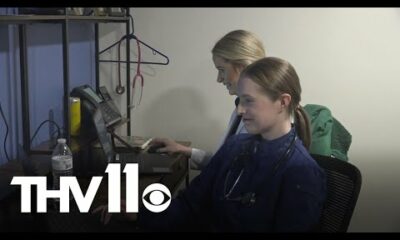Kaiser Health News
States Begin Tapping Medicaid Dollars to Combat Gun Violence
Samantha Young
Fri, 05 Jan 2024 10:00:00 +0000
To tackle America’s gun problem, a growing number of states are using Medicaid dollars to pay for community-based programs intended to stop shootings. The idea is to boost resources for violence prevention programs, which have been overwhelmed in some cities by a spike in violent crime since the start of the covid-19 pandemic.
An infusion of reliable federal funding, advocates say, could allow these nonprofits to expand their reach to more residents most at risk of being shot — or of shooting someone.
So far, California, Colorado, Connecticut, Illinois, Maryland, New York, and Oregon have passed laws approving the use of Medicaid money for gun violence prevention, said Kyle Fischer, policy and advocacy director for The Health Alliance for Violence Intervention, which has lobbied for the federal and state Medicaid policy changes allowing this spending. More states are expected to follow.
“These are concrete things that we can do that avoid the debates around the Second Amendment,” Fischer said.
With gun control legislation stalled in Congress, the Biden administration has opened up federal Medicaid dollars to violence prevention as one of the ways states and cities can combat firearm violence. President Joe Biden announced the novel approach in April 2021, and now the money is starting to flow to interested states.
But the process to unlock the funding has been lengthy, and it’s unclear how much money will ultimately be spent on these programs. Because Medicaid, which provides health care for low-income and disabled residents, is a state-federal program, states must also approve spending the money on violence prevention.
In Illinois, which two years ago became one of the first states to approve Medicaid spending for violence prevention, Chicago CRED hopes to get approval for its program this spring. Arne Duncan, the former U.S. education secretary who leads the violence prevention group, said getting paid by Medicaid will be worth the wait and that he hopes his state’s experience will make it more expeditious for others.
“We’re trying to build a public health infrastructure to combat gun violence,” Duncan said. “Having Medicaid start to be a player in this space and create those opportunities could be a game changer.”
In 2020, many cities around the country confronted a rise in shootings and homicides after officials responding to the pandemic shut down schools, businesses, and critical social services. That same year, police murdered George Floyd, a Black man, in Minneapolis, sparking nationwide protests and calls to cut police funding. Americans, already armed to the hilt, rushed to buy more guns.
While the pandemic has receded and homicide rates have dropped nationally, homicides haven’t gone down in some cities. The number of gun purchases is historically high in the United States, which is estimated to have more guns than people. Programs that worked a few years ago in places like Oakland, Calif. — which had won acclaim for slashing its gun violence — can’t keep up. Memphis in November broke its record for homicides in a year.
“We have a uniquely high prevalence of firearm ownership in the United States,” said Garen Wintemute, a professor of emergency medicine and chair in violence prevention at the University of California-Davis. “We have more guns in civilian hands than we have civilians, with something on the order of 400 million guns in the United States.”
“Guns are tools, and you put a tool in somebody’s hands, they’re going to use it,” he added.
Gun violence also brings a hefty price tag. Studies from the Government Accountability Office and Harvard Medical School have shown that the cost of caring for gunshot survivors ranges from $1 billion in initial treatments to $2.5 billion over the 12 months post-injury. And it’s not only gunshot victims who need medical help.
“The patients that we see, there’s a lot of grief. Parents losing their children, grandparents losing their grandchildren. That impacts people’s health tremendously,” said Noha Aboelata, founding CEO of Roots Community Health Center in Oakland. “Entire neighborhoods have ongoing stress and trauma.”
Despite the long and often bureaucratic process, Medicaid dollars are incredibly attractive for community organizations that have historically relied on philanthropic donations and grants, which can vary year to year.
“Medicaid is reliable,” Fischer said. “If you’re doing the work, you’re qualified for it, and you are taking care of patients, you get reimbursed for the work that you do.”
This article was produced by KFF Health News, which publishes California Healthline, an editorially independent service of the California Health Care Foundation.
KFF Health News is a national newsroom that produces in-depth journalism about health issues and is one of the core operating programs at KFF—an independent source of health policy research, polling, and journalism. Learn more about KFF.
USE OUR CONTENT
This story can be republished for free (details).
——————————
By: Samantha Young
Title: States Begin Tapping Medicaid Dollars to Combat Gun Violence
Sourced From: kffhealthnews.org/news/article/medicaid-violence-prevention-new-state-funding-guns-firearms/
Published Date: Fri, 05 Jan 2024 10:00:00 +0000
Did you miss our previous article…
https://www.biloxinewsevents.com/listen-to-tradeoffs-how-the-loss-of-a-rural-hospital-compounds-the-collapse-of-care/
Kaiser Health News
In Settling Fraud Case, New York Medicare Advantage Insurer, CEO Will Pay up to $100M
SUMMARY: Independent Health Association of Buffalo and Betsy Gaffney, CEO of medical analytics firm DxID, have agreed to a settlement of up to $100 million to resolve Justice Department allegations of fraudulent Medicare billing for exaggerated or non-existent health conditions. Independent Health will pay up to $98 million, while Gaffney will contribute $2 million. Neither party admitted wrongdoing. The case was triggered by whistleblower Teresa Ross, highlighting issues of “upcoding” in Medicare Advantage plans. Ross, having faced repercussions for her allegations, will receive at least $8.2 million from the settlement. This case underscores the challenges of regulating billing practices in the Medicare system.
The post In Settling Fraud Case, New York Medicare Advantage Insurer, CEO Will Pay up to $100M appeared first on kffhealthnews.org
Kaiser Health News
Employers Press Congress To Cement Health Price Transparency Before Trump’s Return
SUMMARY: Despite regulations requiring hospitals and insurers to disclose negotiated prices for healthcare services, the impact on consumer costs remains unclear nearly four years later. While the Trump administration’s initial rules and Biden’s enhancements aimed to streamline this data, compliance is inconsistent; a 2022 audit found only 63 out of 100 hospitals met requirements. Some lawmakers proposed legislation to protect these regulations amid uncertainty about Trump’s potential return to office, but efforts fell short. Experts note the complexity of the data often leaves consumers struggling to understand their actual costs, emphasizing the need for improved transparency and enforcement to facilitate informed healthcare choices.
The post Employers Press Congress To Cement Health Price Transparency Before Trump’s Return appeared first on kffhealthnews.org
Kaiser Health News
He Went in for a Colonoscopy. The Hospital Charged $19,000 for Two.
SUMMARY: Tom Contos, a 45-year-old runner, sought a colonoscopy due to ongoing rectal bleeding. His insurance covered part of the procedure, but he was shocked by the final bill of $19,206, which included charges for two colonoscopies. Despite an initial estimate of $7,203, the charges were much higher due to multiple procedures and biopsies. Contos appealed the charges, but Northwestern Medicine maintained that the billing was correct. Health experts suggest patients consider alternatives like ambulatory surgery centers for lower costs. Transparency and clear pricing are key to avoiding unexpected medical expenses.
The post He Went in for a Colonoscopy. The Hospital Charged $19,000 for Two. appeared first on kffhealthnews.org
-

 News from the South - Arkansas News Feed7 days ago
News from the South - Arkansas News Feed7 days agoFaith-inspired ministry opens health clinic in Little Rock
-

 News from the South - Florida News Feed6 days ago
News from the South - Florida News Feed6 days ago‘Dirty Dancing,’ ‘Beverly Hills Cop,’ ‘Up in Smoke’ among movies entering the National Film Registry
-

 Our Mississippi Home6 days ago
Our Mississippi Home6 days agoThe Meaning of the Redbird During the Holiday Season
-

 Mississippi Today5 days ago
Mississippi Today5 days agoMississippi PERS Board endorses plan decreasing pension benefits for new hires
-

 Local News2 days ago
Local News2 days agoHard Rock Hotel & Casino Biloxi Honors Veterans with Wreath-Laying Ceremony and Holiday Giving Initiative
-

 News from the South - North Carolina News Feed2 days ago
News from the South - North Carolina News Feed2 days agoSocial Security benefits boosted for millions in bill headed to Biden’s desk • NC Newsline
-

 News from the South - Missouri News Feed3 days ago
News from the South - Missouri News Feed3 days agoCould prime Albert Pujols fetch $1 billion in today's MLB free agency?
-

 Mississippi News Video3 days ago
Mississippi News Video3 days ago12/19- Friday will be breezy…but FREEZING by this weekend































